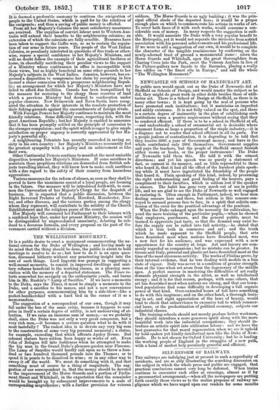NEWCASTLE ON SCHOOLS OF HANDICRAFT ART. Iv public men would
speak out as the Duke of Newcastle did at Sheffield on Schools of Design, and would master the subject as he did, they might do great work in other fields besides those of utili- tarian art. There is a School of Design at Sheffield, as there is in many other towns ; it is kept going by the zeal of persons who have promoted such institutions; but it maintains an imperfect and sickly existence. It is not fully valued on the spot, and there is a certain degree of insincerity in the plan of establishing such institutions upon a passive acquiescence without seeing that they be rendered efficient. If there is to be a school in Sheffield at all, —and undoubtedly a school of ornamental art is desirable where ornament forms so large a proportion of the staple industry,—it is a disgrace not to render that school efficient in all its parts. For a people jealous of centralization, it is degrading to be told that they receive 600!. a year of Government money, and have in the whole contributed only 200!. themselVes. Government supplies and pays the teachers, but the people of Sheffield cannot furnish either rooms or books, or the proper instruments ! The Duke of Newcastle told them this. He told it with the utmost directness ; and yet his speech was so purely a statement of fact, so earnest in its manner, and so little reproachful to those who heard it, that it had all the effect of the harshest plain speak- ino. while it must have ingratiated the friendship of the people that heard it. Plain speaking of this kind, indeed, by presuming the right understanding and good feeling of the hearers, pays a compliment to their faculties, Which is seldom lost if the speaker is sincere. The habit has gone very much out of use in public life, and we are glad to see the Duke of Newcastle so well engaged in restoring it. Often enough in Parliament, indeed, we hear men dealing censure here and there, but seldom is this censure con- veyed to accused persons face to face, in a spirit that solicits con- fession of the error for the practical advantage of the penitent. When the Duke enlarged upon the necessity for cultivation, be- yond the mere training of the particular pupils —when he showed that employers, purchasers, and the general public, must be trained to appreciate just taste, so that the demand may exist be- fore the supply can be called into full aetivity,—he, stated that which is true both in commerce and art; and the truth which he made apparent to the Sheffield people, that arts have flourished most when nations have flourished most, was a new fact for his audience, and was expressed with a new appositeness for the country at large. Art and luxury are com- monly regarded as companions ; but no mistake can be greater. In Greece and Italy, pictorial and plastic art have flourished most at the time of the most strenuous activity. The works of Phidias prove, by their internal evidence, that he was dealing with models in a fine state of vigour. Italy was never in a condition of greater strength than at the time when art arose from the degeneracy of the middle ages. A perfect success in mastering the difficulties of art really demands physical strength in the artist, as well as intellectual energy ; and it is for that reason, perhaps, with some others, that art has flourished most when nations are st!rong, and that our town- bred populations find some difficulty in developing a full organic power of that kind. Over-extended hours of toil have something to do with this inaptness; and on the other hand, a thorough train- ing in art, and right appreciation of the laws of beauty, would tend to check that subservience to excessive toil to which commer- cial lucre, or the predestination of political economy, subjects our industrial classes.
The training-schools should not merely produce better workmen, they should introduce a more generous spirit along with the more beautiful work into the industrial occupations; they should in- troduce an artistic spirit into utilitarian labour : and we have the best guarantee for that moral regeneration when we see it upheld by bold-spoken yet kindly-intellectual men like the Duke of New- castle. He is not chosen for Oxford University ; but he is leading the working people of England in the struggles of a new path, with a hand of modest help peculiarly graceful and efficient.


























 Previous page
Previous page